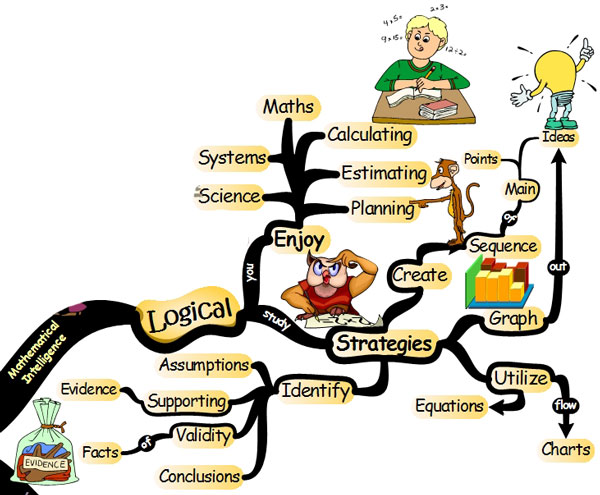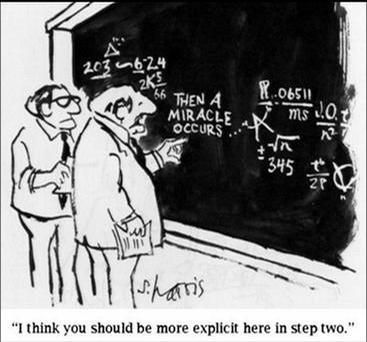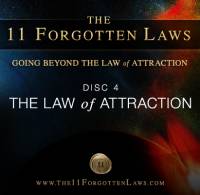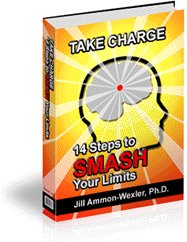|
Mathematical Logical Intelligence Means Putting Two and Two Together.
Your Mathematical Logical Intelligence is one of the 8 intelligences suggested by Howard Gardner as being part of all human thinking skills Multiple Intelligences and learning styles are points along a scale that help us to discover the different forms of mental representations; however, they are not good characterizations of what people are or are not like. We should be careful not to divide the population into a set of intelligence categories and then categorize them into expected behaviour patterns. What these various instruments attempt to do is to allocate a person on some point on a continuum (similar to measuring height or weight) with a number of abilities. In other words, do not pigeonhole people as we are all capable of learning under almost any style, no matter what our preference is. It is just that we do better with some than with others. We all have all of them to some extent. Find out what your preference is. Take the test!
TOWARDS A MORE AUTHENTIC ASSESSMENT
As the education system has stressed the importance of developing mathematical and linguistic intelligences, it often bases student success only on the measured skills in those two intelligences. The infamous IQ test is an example of this kind of assessment. Supporters of Gardner's Theory of Multiple Intelligences believe that this emphasis is unfair. Children whose musical intelligences are highly developed, for example, may be overlooked for gifted programs or may even be placed in a special education class because they do not have the required math or language scores. This has had huge impact on the lives of people in general because it can take a number of years to escape the educational assessment with it’s Mathematical Logical Intelligence bias and the emotional scarring that came with it. Educational systems have, however, often sought to help students develop a sense of accomplishment and self confidence.
Now, recognizing Multiple Intelligences as a foundation for acknowledging the different abilities and talents of students. This theory acknowledges that while all students may not be verbally or mathematically gifted, learners may have an expertise in other areas, such as music, spatial relations, or interpersonal knowledge.
Mathematical Logical Intelligence
This is the capacity to recognize patterns, work with abstract symbols (e.g., numbers, geometric shapes), and discern relationships or see connections between separate and distinct pieces of information.
Children first explore this intelligence by ordering and re-ordering objects. They begin calculating by using material objects such as food, sweets or toys like marbles or blocks. After a while, children are able to do the calculations in their heads without the use of physical tools like fingers or objects. As this intelligence grows, the love of abstraction separates those with mathematical intelligence from the rest. They are able to follow long chains of reasoning very skillfully and are able to calculate very quickly. These are usually the learners who do well in the traditional classroom because they are able to follow the logical sequencing behind the teaching and are, therefore, able to conform to the role expected by the educational system as a whole.
Mathematical Logical Intelligence Classroom situation Idiot savants have shown great ability in the mathematical intelligence. Many are extremely gifted at calculating. Some have been called human calculators: memorizing long tables of information such as train schedules or financial newspaper columns.
Mathematicians and scientists, while considered having the same logical intelligence, have some major differences. The mathematician is interested in the abstract, while the scientist attempts to explain the physical reality.
Mathematicians feel it is most important to recognize patterns wherever they may be, but the scientist is more concerned with explaining the physical universe and the patterns appearing in that field of interest are somewhat different to the mathematical ones.
It is easy to see how Mathematical Logical Intelligence helps great chess players to be successful because they reportedly "see" the patterns of moves – both theirs and their opponent’s in their heads in an abstract way.
Chess is a game where Mathematical Logical Intelligence is used optimally!
Logical math people are also very good at transferring abstract concepts to reality and are often able to communicate these concepts to others. They may also enjoy solving life’s puzzles through the sciences and can be very good inventors, having the skill to visualize – and conceptually alter – an invention before they even make a prototype.
A person such as this may enjoy intricate puzzles and games where players must compete against each other to find the most combinations of similarities or differences in designs and shapes. This requires lightning fast visual analysis and the ability to process information in a certain way.
DESCRIPTION • logical thinking
• Detecting patterns
• Scientific reasoning and deduction
• Perform mathematical calculations • Analyse problems
• Understand relationship between cause and effect towards a tangible outcome or result
• Can easily do math in their head
• Good at strategy games
• Have a mind "like a computer"
• Enjoy science experiments
• Organize things by category
• Abstract thinker
• Look for a rational explanations
• Wonder how things work
RELATED TASKS OR ACTIVITIES
• Perform a mental arithmetic calculation • Create a process to measure something difficult • Analyse how a machine works
• Create a process; devise a strategy to achieve an aim
• Assess the value of a business or a proposition
SOCIETAL ROLES
• Auditor • Accountant • Purchasing agent • Underwriter • Logician • Science teacher • Engineer • Directors • Banker • Auditor • Accountant • Purchasing agent • Underwriter • Mathematician • Scientist • Researcher • Deal-makers • Trouble-shooters • Statistician • Actuary • Computer expert • Technician • Economist • Bookkeeper • Analysts • Insurance brokers • Negotiators Learning /Teaching / Facilitation Strategies
MATHEMATICAL LOGICAL INTELLIGENCE LEARNERS AND WORKERS DO BEST WITH: • Experiments
• Exploring patterns and relationships between things
• Mathematical calculations
• Reasoning
• Logic
• Problem solving
• Classifying
• Working with abstract patterns
• Categorizing
• Creating mental pictures from many perspectives
• Weighing, measuring and organizing data
• Opportunities to find and manipulate information found in books and on the internet
• Recording scientific experiments – maybe with their own video camera
• Sequencing and predicting events or research projects
Technology Tools To Use In The Classroom:
• Organizational tools (databases, calendars)
• Calculation tools (spreadsheets)
• Online calculation tools and utilities
• Scientific equipment (probes)
• Science and math software
• Spreadsheets
• Statistics
• Graphing calculators and software
• Multimedia authoring (HyperStudio) - show results, animate
• Videotape - experiments, demonstrations, data gathering
• Animation - demonstrate an experiment
• Desktop presentation (PowerPoint) - show results
• Online data collection
• Problem solving software
• Webquests
• Computer-aided design - for problem solving
• Strategy, logic, and critical thinking software

Compare these learning requirements with those from the Left Hemisphere and the Right hemispheric learning requirements BUSINESS ACTIVITIES • Gather facts
• Analyse issues
• Solve problems logically
• Argue rationally
• Measure precisely
• Understand technical elements
• Consider financial aspects
• Organizational tools (databases, calendars)
• Calculation tools (spreadsheets)
• Using online calculation tools and utilities
• Scientific equipment (probes
• Utilize Science and math software for business projects
• Spreadsheets
• Statistics
• Read and interpret fine print in documents/contracts logically
• Organise & keep track of essential data
• Develop detailed plans & procedures
• Implement projects in a timely manner
• Articulate plans in an orderly way
• Find overlooked flaws
• Approach problems practically
• Maintain a standard of consistency
• Accurate financial records
• Using graphing calculators and software with accuracy
• Multimedia authoring - show results, animate
• Videotape - experiments, demonstrations, data gathering
• Animation - demonstrate an experiment
• Desktop presentation (PowerPoint) - show results
• Online data collection
• Webquests to aid proposals and research
• Computer-aided design - for problem solving
• Strategy, logic, and critical thinking software can be utilized very successfully
USING IT ALL It is not so much about which intelligences you have, as it is about making them play together! The orchestra of Multiple Intelligences makes beautiful music in which Mathematical Logical Intelligence is but one instrument! Do the test for your instruments from here.
Know all your instruments - test. Notice how this type of thinking correlates with Left Brain thinking And also Right Brain information processing skills Expand all your Intelligences from here! More about the brain holistically PLUS how the Brain works Return from Mathematical Logical Intelligence to Consciousness-Evolving.com
|














